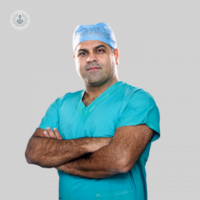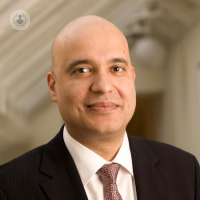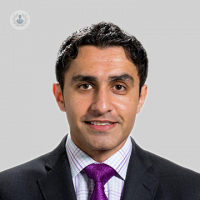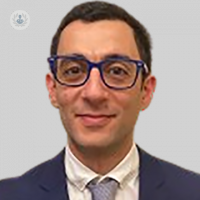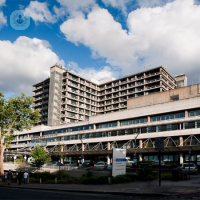What is hoarseness?
Hoarseness refers to uncharacteristic voice changes and sufferers might have difficulty speaking. Vocal sounds may be strained, muffled, raspy, or croaky, and the voice’s pitch or quality may change. It’s almost always caused by a problem in the vocal cords, which are part of the larynx (voice box) and are located in the throat.
There are two types of hoarseness:
- Acute: short-term (usually caused by conditions such as a cold)
- Chronic: long-term (potentially caused by more serious conditions)

What is the outlook for patients suffering from hoarseness?
Depending on each individual case, the prognosis of the disease may vary. Hoarseness is not a serious disease as it usually lasts for about two weeks and the symptoms disappear completely. On the other hand, chronic hoarseness can be a symptom of a serious condition such as throat/laryngeal cancer and thyroid cancer.
What are the symptoms of hoarseness?
The most common symptoms of hoarseness are difficulty breathing or swallowing (dysphagia) and excessive drooling, especially in children. Other symptoms are having a harsh sounding voice, a scratchy throat and a lowered tone of voice.
How is hoarseness diagnosed?
The specialist may:
- Perform a laryngoscopy
- Take a throat culture
- Examine the throat with a small mirror
- Perform a CT scan
- Provide an X-ray of the neck
- Conduct blood tests to run a complete blood count
What are the causes?
The most common cause is inflammation or infection of the vocal cords due to a cold or sinus infection, which often clears up after about two weeks. Another of the most serious causes is laryngeal cancer.
Other common causes can be:
- Gastroesophageal reflux
- Allergies
- Inhalation of irritating substances
- Throat or larynx cancer
- Chronic cough
- Colds or respiratory tract infections
- Tobacco and alcohol
- Voice overload or abuse like yelling or singing
Other causes that can also cause hoarseness and are less common:
- Injury or irritation from a bronchoscopy or breathing tube
- Damage to the nerves and muscles around the larynx from trauma or surgery
- The appearance of foreign bodies in the oesophagus or trachea
- Changes in the larynx during puberty
- Lung or thyroid cancer
- Hypothyroidism
Can it be prevented?
There are a few measures that can help prevent a hoarse voice:
- Drink a lot of liquid to help maintain humidity in the airways
- Avoid actions that fatigue the vocal cords such as whispering, shouting, crying or singing
- Take medications to reduce stomach acid and avoid those that dry out the vocal cords
- Reduce or stop your tobacco consumption
Treatments for hoarseness
If the patient has difficulty breathing or swallowing, is drooling, or the hoarseness has lasted more than three weeks, it’s necessary to go to a specialist for a diagnosis.
As mentioned above, hoarseness can have multiple causes, and so the course of treatment will depend on each case.
Which type of specialist treats hoarseness?
Otolaryngologists (ENTs) are experts of the ear, nose and throat. They the specialists who can make a diagnosis and provide a treatment plan for hoarseness.
03-01-2017 11-02-2023Hoarseness
Mr Karan Kapoor - Otolaryngology / ENT
Created on: 03-01-2017
Updated on: 11-02-2023
Edited by: Conor Lynch
What is hoarseness?
Hoarseness refers to uncharacteristic voice changes and sufferers might have difficulty speaking. Vocal sounds may be strained, muffled, raspy, or croaky, and the voice’s pitch or quality may change. It’s almost always caused by a problem in the vocal cords, which are part of the larynx (voice box) and are located in the throat.
There are two types of hoarseness:
- Acute: short-term (usually caused by conditions such as a cold)
- Chronic: long-term (potentially caused by more serious conditions)

What is the outlook for patients suffering from hoarseness?
Depending on each individual case, the prognosis of the disease may vary. Hoarseness is not a serious disease as it usually lasts for about two weeks and the symptoms disappear completely. On the other hand, chronic hoarseness can be a symptom of a serious condition such as throat/laryngeal cancer and thyroid cancer.
What are the symptoms of hoarseness?
The most common symptoms of hoarseness are difficulty breathing or swallowing (dysphagia) and excessive drooling, especially in children. Other symptoms are having a harsh sounding voice, a scratchy throat and a lowered tone of voice.
How is hoarseness diagnosed?
The specialist may:
- Perform a laryngoscopy
- Take a throat culture
- Examine the throat with a small mirror
- Perform a CT scan
- Provide an X-ray of the neck
- Conduct blood tests to run a complete blood count
What are the causes?
The most common cause is inflammation or infection of the vocal cords due to a cold or sinus infection, which often clears up after about two weeks. Another of the most serious causes is laryngeal cancer.
Other common causes can be:
- Gastroesophageal reflux
- Allergies
- Inhalation of irritating substances
- Throat or larynx cancer
- Chronic cough
- Colds or respiratory tract infections
- Tobacco and alcohol
- Voice overload or abuse like yelling or singing
Other causes that can also cause hoarseness and are less common:
- Injury or irritation from a bronchoscopy or breathing tube
- Damage to the nerves and muscles around the larynx from trauma or surgery
- The appearance of foreign bodies in the oesophagus or trachea
- Changes in the larynx during puberty
- Lung or thyroid cancer
- Hypothyroidism
Can it be prevented?
There are a few measures that can help prevent a hoarse voice:
- Drink a lot of liquid to help maintain humidity in the airways
- Avoid actions that fatigue the vocal cords such as whispering, shouting, crying or singing
- Take medications to reduce stomach acid and avoid those that dry out the vocal cords
- Reduce or stop your tobacco consumption
Treatments for hoarseness
If the patient has difficulty breathing or swallowing, is drooling, or the hoarseness has lasted more than three weeks, it’s necessary to go to a specialist for a diagnosis.
As mentioned above, hoarseness can have multiple causes, and so the course of treatment will depend on each case.
Which type of specialist treats hoarseness?
Otolaryngologists (ENTs) are experts of the ear, nose and throat. They the specialists who can make a diagnosis and provide a treatment plan for hoarseness.
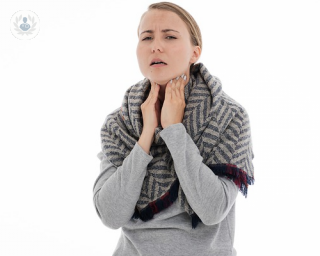

FAQs about alcohol and the throat
By Mr Julian McGlashan
2024-11-21
Mr Julian McGlashan, an experienced consultant ENT surgeon, sheds light on some of the ways alcohol abuse can negatively affect your throat. See more
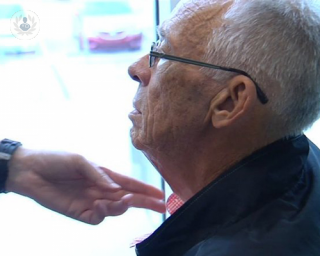

Doctors’ changing views on reflux and the throat: Laryngology 3.0
By Professor Martin Anthony Birchall
2024-11-20
Over the decades there have been new techniques and methods discovered for treatment of throat problems and reflux. Internationally renowned consultant otolaryngologist Professor Martin Anthony Birchall provides a descriptive background of where the treatments started and how far they have come in recent times. See more


Lesser-known causes of hoarseness
By Mr Kalpesh Patel
2024-11-20
The most common causes of a hoarse voice include an inflammation of the airways from infection, vocal cord nodules due to overuse, or acid reflux. However, a sizeable number of people have a hoarse voice due to various lesser-known conditions, as explained by leading ENT surgeon Mr Kalpesh Patel below. See more
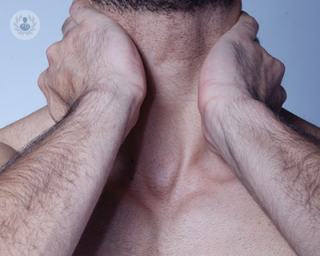

Pharyngeal pouch: An expert guide
By Mr Gaurav Kumar
2024-11-20
Revered consultant ear, nose and throat (ENT) surgeon Mr Gaurav Kumar gives an informative guide to pharyngeal pouch, including the commonly associated symptoms, diagnostic process and treatment, in this expert article. See more
Experts in Hoarseness
-
Professor Guri Sandhu
Otolaryngology / ENTExpert in:
- Voice disorders
- Tracheostomy
- Dysphagia
- Paediatric ENT
- Sleep apnoea
- Hoarseness
-
Mr Ravinder Singh Natt
Otolaryngology / ENTExpert in:
- Dysphagia
- Hoarseness
- Tonsillitis
- Blocked nose
- Deafness
- Snoring
-
Mr Julian McGlashan
Otolaryngology / ENTExpert in:
- Voice disorders
- Dysphonia
- Aphonia (loss of voice)
- Laryngitis
- Phonosurgery
- Hoarseness
-
Mr Suliman El-Shunnar
Otolaryngology / ENTExpert in:
- Hoarseness
- Disorders of nasal breathing
- Neck lump
- Chronic cough
- Ear infection
- Thyroid disorders
- See all

The Royal Free Hospital
The Royal Free Hospital
Pond Street, Hampstead. NW3 2QG
No existe teléfono en el centro.
By using the telephone number provided by TOP DOCTORS, you automatically agree to let us use your phone number for statistical and commercial purposes. For further information, read our Privacy Policy
Top Doctors

Kings Oak Hospital - part of Circle Health Group
Kings Oak Hospital - part of Circle Health Group
127 The Ridgeway, Enfield EN2 8JL
No existe teléfono en el centro.
By using the telephone number provided by TOP DOCTORS, you automatically agree to let us use your phone number for statistical and commercial purposes. For further information, read our Privacy Policy
Top Doctors

The Park Hospital - part of Circle Health Group
The Park Hospital - part of Circle Health Group
Sherwood Lodge Drive, Burntstump Country Park, Arnold, Nottinghamshire NG5 8RX
No existe teléfono en el centro.
By using the telephone number provided by TOP DOCTORS, you automatically agree to let us use your phone number for statistical and commercial purposes. For further information, read our Privacy Policy
Top Doctors
-
The Royal Free Hospital
Pond Street, Hampstead. NW3 2QG, Central LondonExpert in:
- General Surgery
- Orthopaedic surgery
- Robotic Surgery
- Dermatology
- Obstetrics and Gynaecology
- Paediatrics
-
Kings Oak Hospital - part of Circle Health Group
127 The Ridgeway, Enfield EN2 8JL, North LondonExpert in:
- Cancer
- Cardiology
- General Surgery
- Orthopaedic surgery
- Diagnostic Imaging
- Obstetrics and Gynaecology
-
The Park Hospital - part of Circle Health Group
Sherwood Lodge Drive, Burntstump Country Park, Arnold, Nottinghamshire NG5 8RX, ArnoldExpert in:
- General Surgery
- Maxillofacial Surgery
- Oral surgery
- Plastic surgery, reconstructive and aesthetics
- Obstetrics and Gynaecology
- Podiatry
- See all
- Most viewed diseases, medical tests, and treatments
- Migraine
- Minimal access surgery (keyhole surgery)
- Head and neck cancer
- Neck lump
- Botulinum toxin (Botox™)
- Thyroid disorders
- Anti-ageing treatments
- Medicolegal
- Ear wax plugs
- Vertigo
